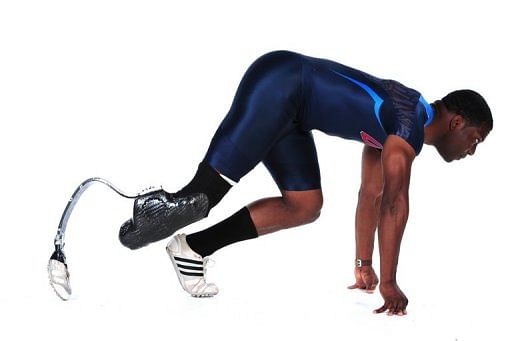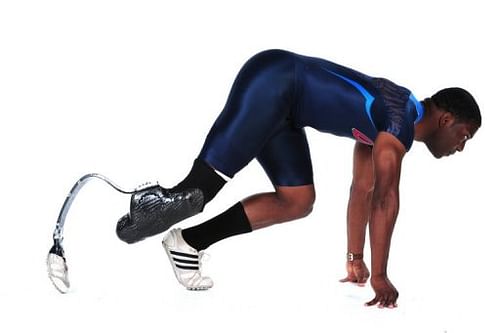
US sprinter backs Pistorius blade rule review
LONDON (AFP) –

US sprinter Jerome Singleton, pictured in 2011, on Wednesday backed calls by Oscar Pistorius for a review of runners’ artificial running prostheses after the South African claimed he was at a disadvantage over blade length.
US sprinter Jerome Singleton on Wednesday backed calls by Oscar Pistorius for a review of runners’ artificial running prostheses after the South African claimed he was at a disadvantage over blade length.
The 26-year-old also said he believed that the time had come to end joint category races, to avoid allegations of unfairness between single and double-leg amputee runners.
Speaking after securing a place in the T44 100m final in London, he told reporters: “All I know is that there is a maximum height (for running blades).
“I think we need to come together and re-evaluate the formula and have an idea of the exact height for an athlete to run in or maybe have a variation in height of 1cm, so you know you’re racing the same athlete in all competitions.”
Singleton, a former National Aeronautics and Space Administration (NASA) intern, added: “As time changes science changes too, so we just have to make sure that it is fair to all competitors.
“Right now it’s like (comparing) apples to oranges not apples to apples.”
Singleton is a T44 single-leg amputee athlete, as is world record holder Jonnie Peacock of Britain, who also made the final. Pistorius and new Paralympic 200m champion Alan Oliveira of Brazil are double-leg amputees.
But all run in the same race because of a lack of competitors in both categories with the qualifying standard.
Oliveira inflicted the first 200m defeat on Olympic and Paralympic star Pistorius in nine years, prompting the South African to claim that his rivals were “a lot taller” and he was at a disadvantage in terms of stride length.
The International Paralympic Committee (IPC) rejected claims that athletes in the race switched blades before competition and the prostheses, the length of which is calculated to ensure they are proportional to body length, were illegal.
Singleton, the T44 100m silver medallist in Beijing, said the situation was not new but suggested that action was required.
“I think that the time has come that the T43s and the T44s have to split their classes. Unless we can split the classes we need to review or evaluate that formula,” he added.
The IPC said this week that it is looking to introduce more single category races and field events in athletics for the next Games in Rio de Janeiro, Brazil, in 2016.